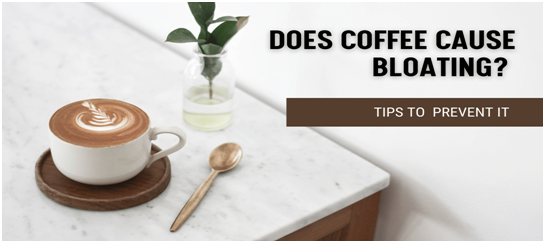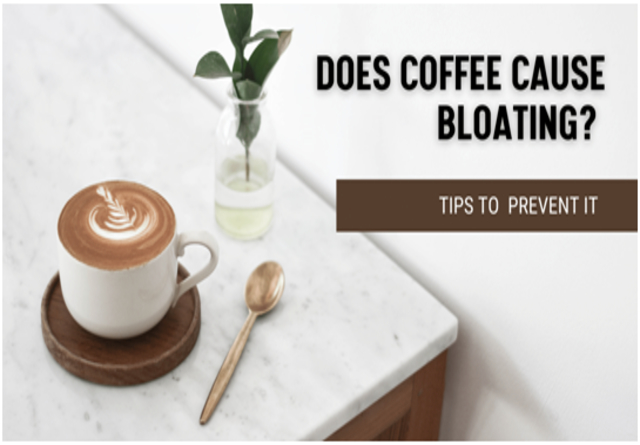Coffee is a staple of many people’s diets. However, some people experience bloating when Caffeine enters their bodies. This could be a result of drinking too much coffee throughout the morning or even the caffeine from the coffee could be adding to your weight.
Nobody likes a bloated feeling. Why suffer through uncomfortable bloating when the cause is something you can remedy? When it comes to coffee, bloating is caused by caffeine, thanks to the diuretic properties of the beverage. Now that you understand how coffee causes bloating, you can work on making the right adjustments in your diet and your caffeine intake. Let’s find out how in this article!
Higher levels of caffeine lead to more acid in your body which triggers an inflammatory response in your stomach lining, causing you to feel bloated and uncomfortable. Caffeine is a natural stimulant found throughout various plants like coffee and tea and it is often added to many soft drinks and energy drinks as well. When you drink coffee, your body absorbs not only the caffeine but also other chemicals in the beverage such as theobromine and cafestol. These chemicals not only affect the physical sensation you experience such as alertness but also have physiological effects that can impact certain parts of your body like your digestive tract and stomach lining causing uncomfortable bloating.
Caffeine directly interacts with a hormone that regulates your digestive processes called cholecystokinin, which can result in heartburn and indigestion for some people. However, there are things you can do to mitigate caffeine’s effects on your body, such as drinking decaf coffee or decaffeinating your own regular coffee, and exercising regularly to help reduce bloating.
Additionally, caffeine can dehydrate your body which can also lead to bloating.
How Can You Prevent Bloating From Coffee?

The caffeine content in coffee can vary widely between brands and the type of coffee bean used in the roast. However, an average cup of coffee can contain as much as 100mg of caffeine. This amount could quickly add up if you drink several cups of coffee daily. If you want to reduce your risk of experiencing uncomfortable bloating, limit your daily caffeine intake to 300mg or less per day. Keep in mind that your daily caffeine intake could be.
Some studies suggest that 80 mg of caffeine per cup is the recommended amount for limiting bloating, however, this can vary between people. A cup of coffee contains anywhere from 75-200 mg of caffeine, so depending on how sensitive you are to caffeine, the effects of coffee on your stomach can vary drastically.
Caffeine Consumption Golden Rules:
• Do not consume caffeine on an empty stomach in the morning, as your liver has to process everything during the night. Since your liver is busy processing everything, it could have trouble breaking down and neutralizing the caffeine. This can cause insomnia, nervousness, and restlessness.
• Limit your caffeine consumption to 100 mg/day and not more than 300 mg/day.
Use tea instead of coffee if coffee does not suit your system! Green tea also contains plenty of antioxidants as well as flavonoids which can reduce the risk of developing cancer while helping you lose weight. Drinking tea instead of coffee throughout the day will give you the benefits of tea while avoiding the caffeine at the risk of experiencing too much acid in your stomach, which could cause discomfort and bloating. Reduce your intake of soda and energy drinks! These beverages contain loads of sugar and calories.
Coffee on an empty stomach is a strict no-no! Coffee is best consumed after a meal or with a light snack to avoid stomach upset and ease digestion. Also, avoid drinking coffee if you are experiencing nausea or diarrhea as these symptoms are usually temporary and can be triggered by caffeine.

You may also like: Does Coffee Cause Gas? (Answered With Solution)
How Would You Know That You Are Sensitive To A Cup Of Coffee?
Does coffee cause you problems in the morning? Does drinking coffee make you feel nauseous? Are there any other symptoms you experience after drinking coffee? Do you experience bloating after drinking coffee? Does coffee cause constipation or diarrhea? Do you experience constipation or diarrhea after drinking coffee? If you answer yes to any of these questions, your body is telling you something! Coffee is healthy and has many positive benefits but excessive consumption of it can result in unfavorable side effects, such as stomach discomfort and bloating.
I Have Decided To Give Up Coffee, But I Really Miss It. Is It Okay To Drink Decaf When I Need Some Caffeine?
Decaffeinated coffee contains less than 0.1% of caffeine as the beans are decaffeinated using a chemical process. However, the decaffeinated coffee still contains chemicals such as trigonelline and cafestol that can trigger the production of excess stomach acid which can result in heartburn and indigestion for some people. If you notice that drinking only decaf coffee does not make you feel the same as it did with a regular cup of coffee, you might want to try cutting down on your daily coffee intake to avoid side effects like bloating and stomach issues.
What Is The 5 Best Way To Lessen The Possibility Of Developing Stomach Issues After Drinking A Cup Of Coffee?
Drinking a cup of coffee on an empty stomach can also trigger heartburn and indigestion if your body does not have the strength to process and neutralize the caffeine. Therefore, the best way to lessen the chances of experiencing stomach issues after drinking coffee is:
- Drink a cup of coffee together with a bit of food in your stomach or a healthy snack or meal. This will give your body the boost it needs to process coffee and neutralize the caffeine without causing stomach issues or bloating.
- Don’t drink coffee close to bedtime: Caffeine is a stimulant and it can prevent you from falling asleep when you need to rest. Therefore, it is best to avoid drinking coffee close to bedtime or with anything that can interfere with your ability to get a good night’s rest. This includes alcohol, certain medications such as sleeping pills, and nicotine.
- Drink water instead of coffee: Drinking coffee often dehydrates you which can result in constipation and bloating. Drinking water instead can help you stay hydrated and combat the effects of dehydration. Water can also help reduce the effects of caffeine on your digestive system as it dilutes the acid in your stomach and neutralizes the effects of caffeine.
- Exercise regularly: Exercising regularly can also help reduce bloating as it helps purge your body of toxins and excess fluids that can make you feel bloated. Exercising regularly can also help you lose weight which can reduce your risk of experiencing the negative effects of caffeine on your body.
- Limit your caffeine intake: As mentioned above, caffeine can disrupt your sleep and interfere with your digestion system which can lead to uncomfortable bloating and stomach issues. Therefore, it is best to limit your daily caffeine intake to 300mg per day. Remember, this daily amount varies from person to person depending on their level of sensitivity to caffeine as well as other factors that could affect their reaction to it. If drinking coffee or tea causes you to suffer from heartburn, indigestion, or bloating, it might be a good idea to cut down or completely avoid caffeine as it might be triggering your digestive issues. Consider switching to tea instead of coffee.
To summarize coffee does cause bloating, but how much depends on you. If you drink coffee with milk and sugar, expect to experience bloating. But if you don’t add any sugar or milk to your coffee, then you may not have any bloating.




